Samsung Galaxy Nexus & Ice Cream Sandwich Review
by Brian Klug & Anand Lal Shimpi on January 18, 2012 1:34 PM ESTThe Browser
The improvements to the Android web browser are some of the most noticeable in Ice Cream Sandwich. Browser performance both in JavaScript rendering and web page scrolling is worlds better than in Gingerbread. We've already explained why scrolling is smoother (full OpenGL ES render path), while the js performance improvements come courtesy of a newer V8 rendering engine in ICS.
The browser in 4.x also includes essentially everything that made the browser in 3.x smooth as well. As opposed to the Android 2.x browser's immediate rendering system - which would redraw the page in its entirety as you zoomed and panned around and seem choppy as a result - Android 3.x/4.x now render tiles into a backing store for webpages. This is the same system that iOS, webOS, and Samsung's custom browsers use, and as a result panning and translating around is now just as smooth as it is in those platforms. To be totally honest, this is probably one of the single largest and most welcome improvements over Android 2.x because of how dramatic the difference is.
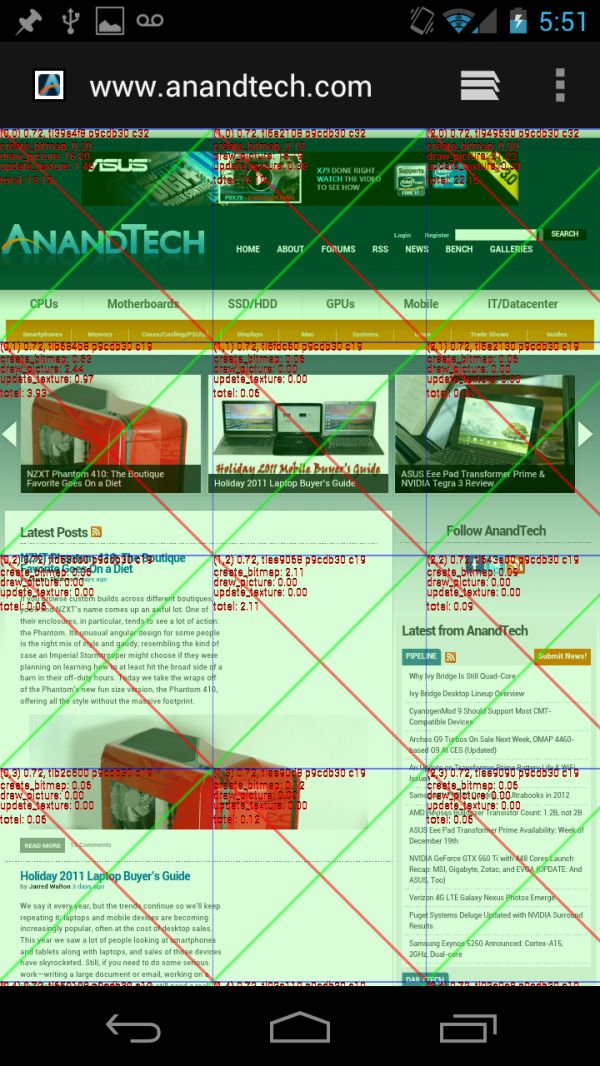
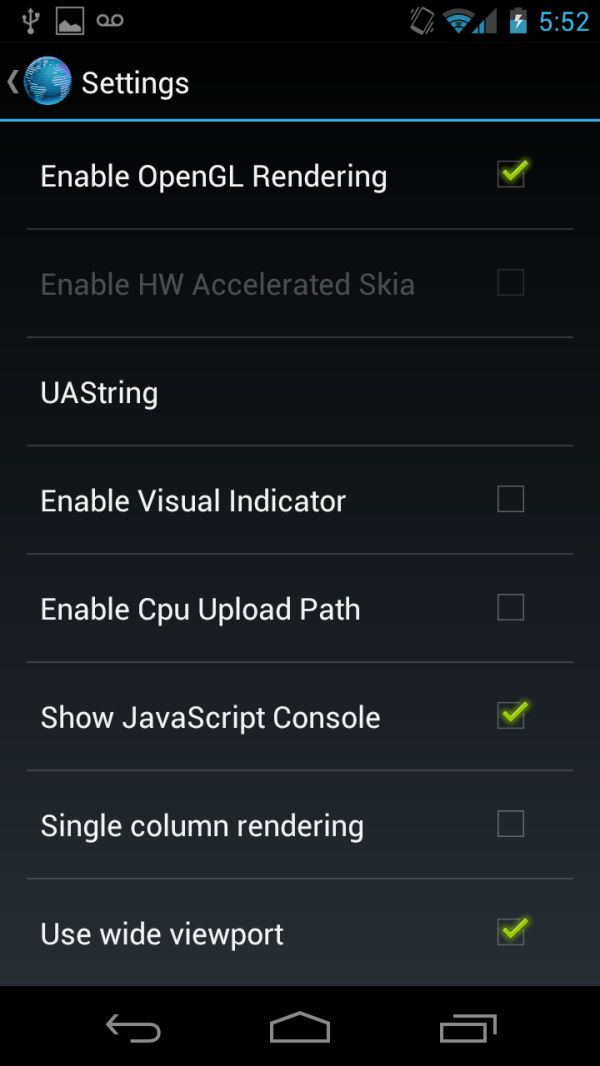
Android 4.0 browser with visual indicator enabled (left), debug settings (right)
In Android 4.0 you can actually go inside the debug settings for the browser (enter about:debug into the address bar, enter, then a new settings pane emerges) and enable or disable OpenGL assisted rendering for the browser. With it off, it feels just like 2.x's choppy stock browser, and with it on, it feels buttery smooth like 3.x. The difference is beyond dramatic. This is actually a feature that was present in Android 3.x as well.
A look at SunSpider and Browsermark performance tells us all we need to know about how the JavaScript V8 engine performance has changed under ICS:
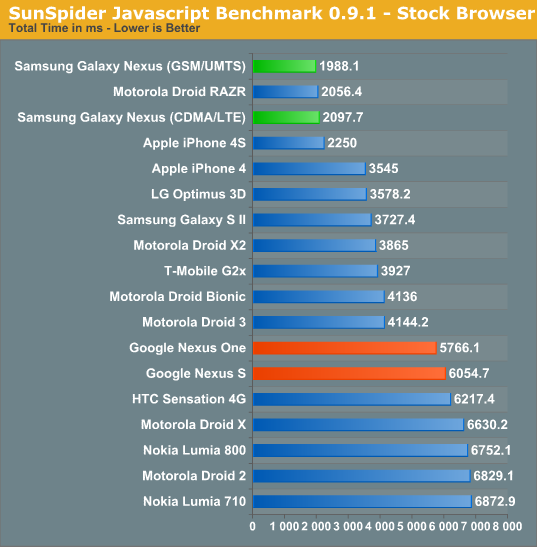
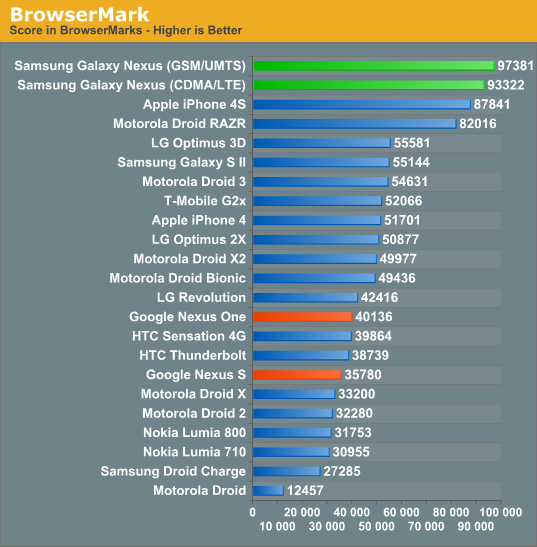
While companies like Motorola and Samsung backported parts of the Honeycomb browser to their own Gingerbread browsers, the stock Gingerbread browser needed work. ICS modernizes the Android web browser and finally removes the need for third party customizations, at least from a performance standpoint.
| Gingerbread vs. Ice Cream Sandwich | ||||
| Gingerbread | Ice Cream Sandwich | |||
| Browser |
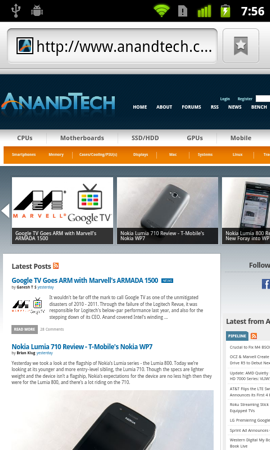 |
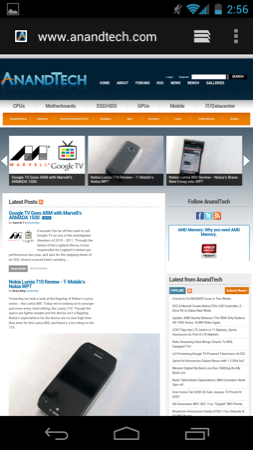 |
||
The ICS browser is still WebKit based and uses a much newer version of WebKit than what you'll find in Android 2.3.6. Compared to the latest Honeycomb browser however there's not all that much difference in version number. The ICS browser does still use an older version of WebKit than Mobile Safari in iOS 5.0.1:
| User Agent String Comparison | |||||
| Device | OS | WebKit Version | UA String | ||
| Apple iPhone 4S | iOS 5.0.1 | 534.46 | Mozilla/5.0 (iPhone; CPU iPhone OS 5_0_1 like Mac OS X) AppleWebKit/534.46 (KHTML, like Gecko) Version/5.1 Mobile/9A405 Safari/7534.48.3 | ||
| Samsung Galaxy Nexus | Android 4.0.2 | 534.30 |
Mozilla/5.0 (Linux; U; Android 4.0.2; en-us; Galaxy Nexus Build/ICL53F) AppleWebKit/534.30 (KHTML, like Gecko) Version/4.0 Mobile Safari/534.30 |
||
| ASUS TF Prime | Android 3.2.1 | 534.13 |
Mozilla/5.0 (Linux; U; Android 3.2.1; en-us; Transformer Prime TF201 Build HTK75) AppleWebKit/534.13 (KHTML, like Gecko) Version/4.0 Safari/534.13 |
||
| Google Nexus One | Android 2.3.6 | 533.1 | Mozilla/5.0 (Linux; U; Android 2.3.6; en-us; Nexus One Build/GRK39F) AppleWebKit/533.1 (KHTML, like Gecko) Version/4.0 Mobile Safari/533.1 | ||
HTML5 compatibility is fairly similar to Honeycomb, although a significant improvement compared to Gingerbread. If you haven't had any experience with Honeycomb tablets, the ICS browser will feel like like brand new technology.
| The HTML5 Test | ||||||||
| Test | Apple iPhone 4S | Samsung Galaxy Nexus | Google Nexus One | ASUS Eee Pad Transformer | ASUS Eee Pad Transformer Prime | |||
| OS | iOS 5.0.1 | Android 4.0.2 | Android 2.3.6 | Android 3.2.1 | Android 3.2.1 | |||
| WebKit Version | 534.46 | 534.30 | 533.1 | 534.13 | 534.13 | |||
| Total Score | 305 (and 9 bonus points) | 256 (and 3 bonus points) | 182 (and 1 bonus point) | 222 (and 3 bonus points) | 233 (and 3 bonus points) | |||
| Parsing rules | 11 (2 bonus points) | 11 (2 bonus points) | 1/11 | 11 (2 bonus points) | 11 (2 bonus points) | |||
| Canvas | 20 | 20 | 20 | 20 | 20 | |||
| Video | 21/31 (4 bonus points) | 21/31 | 21/31 | 21/31 | 21/31 | |||
| Audio | 20 (3 bonus points) | 20 (1 bonus point) | 20 (1 bonus point) | 20 (1 bonus point) | 20 (1 bonus point) | |||
| Elements | 22/29 | 23/29 | 13/29 | 20/29 | 20/29 | |||
| Forms | 77/100 | 57/100 | 33/100 | 54/100 | 54/100 | |||
| User Interaction | 17/36 | 17/36 | 0/36 |
0/36 |
0/36 | |||
| History and navigation | 5 | 5 | 5 | 0/5 | 0/5 | |||
| Microdata | 0/15 | 0/15 | 0/15 | 0/15 | 0/15 | |||
| Web applications | 15/20 | 15/20 | 19/20 | 15/20 | 15/20 | |||
| Security | 5/10 | 5/10 | 5/10 | 5/10 | 5/10 | |||
| Geolocation | 15 | 15 | 15 | 15 | 15 | |||
| WebGL | 9/25 | 9/25 | 0/25 | 0/25 | 9/25 | |||
| Communication | 32/36 | 12/36 | 9/36 | 10/36 | 12/36 | |||
| Files | 0/20 | 10/20 | 0/20 | 10/20 | 10/20 | |||
| Storage | 15/20 | 15/20 | 15/20 | 15/20 | 15/20 | |||
| Workers | 15 | 0/15 | 0/15 | 0/15 | 0/15 | |||
| Local multimedia | 0/20 | 0/20 | 0/20 | 0/20 | 0/20 | |||
| Notifications | 0/10 | 0/10 | 0/10 | 0/10 | 0/10 | |||
| Other | 6/8 | 6/8 | 6/8 | 6/8 | 6/8 | |||
Performance and compatibility are obvious improvements, however there's much more to the ICS browser. For starters it implements tabbed browsing, a feature that has been available on Honeycomb but not in Gingerbread. Given the small screen size, tabs aren't immediately visible but are instead switched between after hitting the tabs button. The process makes sense and thanks to GPU accelerated drawing, scrolling through tabs is extremely smooth.
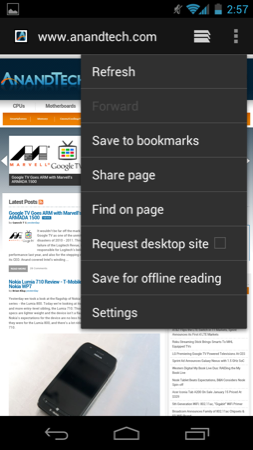
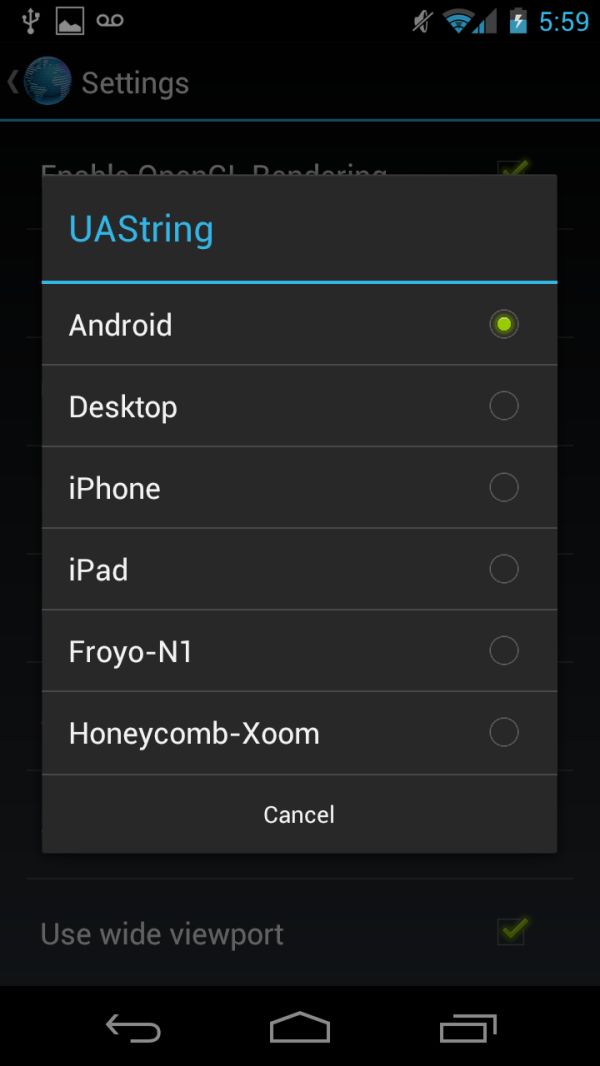
The normal desktop UA switcher (left), More options under developer settings (right)
Google added quick user agent switching to ask for desktop versions of websites vs. mobile by default through a checkbox under settings. Enabling the option changes the browser's UA string from representing itself as a mobile Safari browser to Chrome 11. There's also a menu inside debug settings to change your user agent (UAString) to look like the desktop, iPhone, iPad, Nexus One with Froyo, or a Xoom with Honeycomb.
| User Agent String Comparison | |||||
| Device | UA String | ||||
| Default |
Mozilla/5.0 (Linux; U; Android 4.0.2; en-us; Galaxy Nexus Build/ICL53F) AppleWebKit/534.30 (KHTML, like Gecko) Version/4.0 Mobile Safari/534.30 |
||||
| Desktop |
Mozilla/5.0 (X11; Linux x86_64) AppleWebKit 534.24 (KHTML, like Gecko) Chrome/11.0.696.34 Safari/534.24 |
||||
Prior to ICS, the browser was a serious limitation of the Android platform on smartphones - it was choppy, and something OEMs continually replaced with their own (sometimes worse, sometimes better) browser. Granted you could always download and replace the browser with one of your own choosing, but for the mainstream user the Gingerbread browser was a problem. In ICS the browser is a blessing to use. It's very fast, smooth and compatible. We've had no problems using the Honeycomb browser and the same can be thankfully said about the evolution of it in ICS.










185 Comments
View All Comments
TedG - Wednesday, January 18, 2012 - link
I am looking forward to ICS on my RAZR. It seems similar in power and size to the Nexus.Jonathan Dum - Wednesday, January 18, 2012 - link
Any comments on the quality of the touch sensors? My biggest gripe with my Nexus One is the absolutely inane touch accuracy in comparison to an iPhone. If these new ICS phones have significantly improved touch sensors, I may be coaxed into sticking with Android.jalexoid - Wednesday, January 18, 2012 - link
Synaptics touchscreen controller on N1 was to blame. Even the HTC's "copy" Desire had a much better touchscreen experience due to a better touchscreen controller.All devices after that should have a really good controller.
tipoo - Thursday, January 19, 2012 - link
Same with my Nexus S. The locational accuracy is good, but it actually senses a tap with my finger a few millimeters above the screen, which can cause problems with the keyboard and other precise apps.Brian Klug - Thursday, January 19, 2012 - link
That was always my bug with the Nexus One as well, and it remains an unsolved problem to this day on that phone.I've seen no touch recognitions at all on the Galaxy Nexus. For the most part honestly these issues have gone away as the OEMs stopped being cheap with their capacitive layers and controllers. The Nexus One was especially bad.
I've seen some people complaining about issues with recognition in the bottom right corner - hardware swaps fix those problems.
-Brian
Skiddywinks - Wednesday, January 18, 2012 - link
... is the GN still going to be the best Android on the market? I upgrade in March, and it basically comes down to the S2 or the GN. Each has their advantages, but personally it largely comes down to the display and the GPU.I like to play emulated games on my phone, but I don't know how they work in terms of whether they are software only, or can GPU accelerate. The better GPU in the S2 doesn't really do much if the GN can play everything else on the market at no apparent deficit. Better display all the way in that case. GN wins.
I'm not liking the lack of mSD in the GN either, though.
BAH. Decisions, decisions.
tipoo - Thursday, January 19, 2012 - link
Yeah, the Mali 400 in the GS2 might benchmark way higher than the Galaxy Nexus, but there are no games that exclusively run on it, or even that have more features on it like Tegra phones. I'd guess that even with its relatively weak GPU the Galaxy Nexus will never leave you wanting in games for the next year or two, and its screen is better. My Nexus S can still play top end games like Shadowgun, and that was built for more powerful tablets. With Android developers aim for middling hardware.medi01 - Wednesday, January 18, 2012 - link
@Android is an OS that, although more closed than many would like, still allows more flexibility than iOS@And that comparing Open Source OS to something as closed as it gets. It is merely "still allows more than iOS", hilarious.
doobydoo - Thursday, January 19, 2012 - link
The openness of Android wasn't being compared to iOS, the flexibility was.Two separate points.
Gwynbleidd - Wednesday, January 18, 2012 - link
Two things, though:1. You wrote "Business is as usual for Windows users as ICS based devices just appear as a drive letter thanks to native MTP support." - that's not true, because of MTP Nexus appears in My Computer in Windows as a multimedia device and does not have a letter assigned, so sadly it's not possible to use traditional file managers like Total Commander to deal with files on it without additional plugins.
2. Did you notice any screen quality issues in your devices? Mine shows ugly pinkish smudges visibly especially on gray backgrounds, here's photo (it's out of focus on purpose, otherwise there would be a rainbow goo on screen):
http://img812.imageshack.us/img812/7794/nexussmudg...
So when scrolling webpages you can see that text is pinkish at the top, then white stripe, then pinkish again... Apparently I'm not the only one having this issue with Nexus, and there is a long thread on xda forum about the same problem with Galaxy Note Screens
http://forum.xda-developers.com/showthread.php?t=1...
A little investigation, maybe? ;)